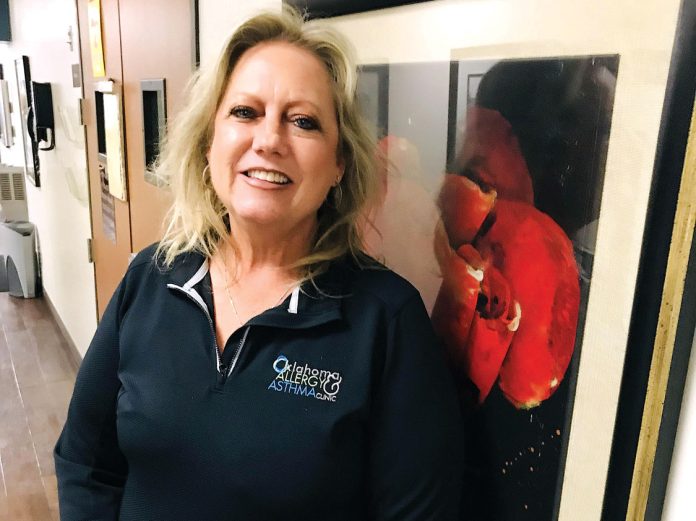
story and photo by James Coburn, Staff Writer
An allergy doesn’t only present itself with a sneeze.
“Typically, people will have nasal congestion, runny and itchy eyes and maybe a cough,” said Angela Turney, LPN, nurse manager at the Oklahoma Allergy & Asthma Clinic. “If they have a rash or eczema, we’ll see them.”
The Oklahoma Allergy & Asthma Clinic tests for air-born allergens as well as venom testing, patch testing, food challenges and a variety of allergies. Asthma education and pulmonary function testing is available. Immunotherapy involves skin testing on the patient’s arms or back.
Patients may be allergic to mold, grass, weeds, dogs and cats. A physician will order a serum for a regiment of weekly injections.
Patients are sometimes surprised to learn their allergy is not from what they thought it would be.
“Then we have the ones that come in and are allergic to cats and dogs, and they’re not about to get rid of that dog,” Turney explained. “Their dog sleeps in their bed and they’re not getting rid of it.”
Patients often find they are allergic to more than one item. And the clinic usually tests for 60 items.
“With allergies and asthma, nurses don’t usually get that training in school. So, unless they’ve worked in an allergy and asthma clinic they usually come here with no experience.”
The Oklahoma Allergy & Asthma Clinic spends from five to seven weeks training nurses for the task. They must be flexible and either work at one of the clinics as a float nurse or work specifically with a physician or nurse practitioner.
Turney earned a Bachelor of Science degree in Health Care Administration from the University of Phoenix and has been an LPN for 26 years. She studied to be an LPN and worked in women’s healthcare for 11 years prior to coming to the Oklahoma Allergy & Asthma Clinic 13 years ago.
She found that being a nurse at the Oklahoma Allergy & Asthma Clinic on the campus of the University of Oklahoma Health Sciences Center was far different from her role in women’s healthcare. The change was made easy by a great team of doctors and nurses. Currently there are 46 nurses and CNAs on staff and each doctor or nurse practitioner has two nurses working with them.
“We work well together as a team with five different locations. I can call on them anytime and they are flexible,” she said.
The nursing staff has a lot of long-term patients. They may even see generations of patients from a grandparent, parent, and a child.
“When patients come, they are long-term patients for the most part,” Turney said. “So, when they call, they want to talk to the nurse because they’ve developed a relationship with them.”
A new patient’s first appointment may take three or four hours, Turney continued. And most of the patient’s time is spent with their nurse doing testing and documenting their history. Follow-up appointments are made by the nurse. Prescription education is given.
“So, it’s really important that they are able to communicate well with generational patients, and we see anyone from 2 all the way to 102,” Turney said. “So, the nurses need to work well with geriatrics and children. They need to be able to calm the nerves of children with anxiety. When they come in here, their anxiety is high. You walk in with a bunch of needles, and they need to be able to calm that child down.”
Asthma is also problematic. An example of allergy induced asthma could be by encountering cat hair. Patients learn to avoid it as best as they can.
“We put them on an inhaler for the long-term, or they might have a short acting bronchodilator for emergencies,” Turney said. “A lot of children come in. They’re athletic and they get shortness of breath when they’re playing ball. And so, they have a rescue inhaler. We ask them to use it about 15 minutes before they start playing.”
It’s important for patients living with asthma to be compliant with the medications the physician prescribes.
“If they’re not, they’re probably going to have exacerbations and will probably end up in the ER,” she said.
Some of the nurses on staff have asthma and allergies. They have an opportunity upon being hired to be skin tested.
“They are more able to understand what the patients are saying when they’ve experienced it themselves,” Turney said.
Turney became a nurse because she wants to help people. She helps not only patients but the nursing staff.
“Everyone has a story. Everyone has life happen to them,” she said. “And I like to be able to help them adjust during their difficult times.”
For more information on Oklahoma Allergy & Asthma Clinic, visit
https://oklahomaallergy.com/












